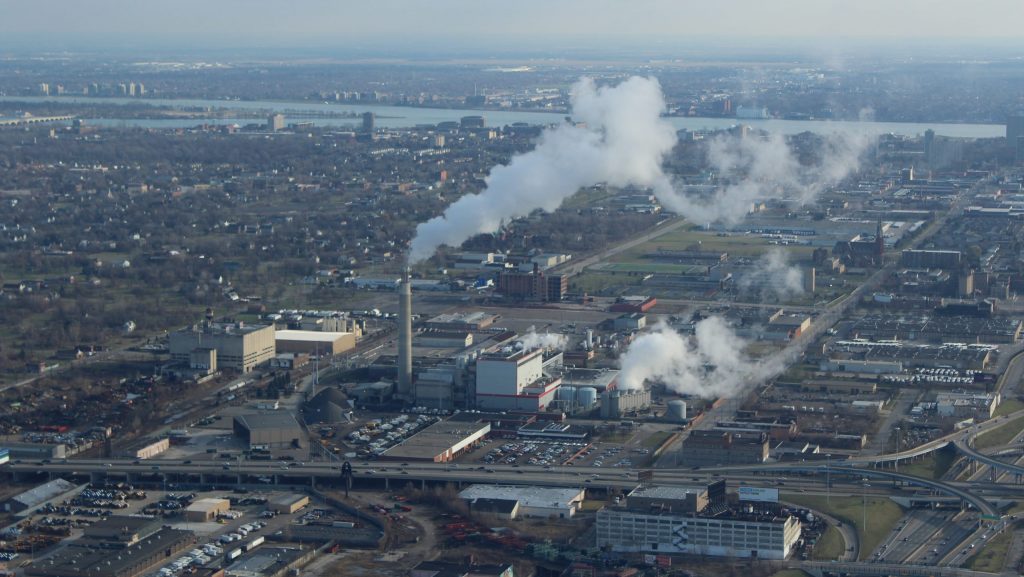Environmental, Public Health Workers Push 2020 Census to Prepare for Future Crises
Census data is crucial for environmental regulation and public health initiatives — especially during a crisis, like the current COVID-19 global pandemic.

An aerial view of the former Detroit incinerator, which closed in 2019 and was demolished in 2023.
The 2020 U.S. Census is underway (tip: you can fill it out online here) and Census and community organization workers are canvassing Detroit neighborhoods to get an accurate count of its residents.
“One of the big takeaways I got from talking about this issue was how crucial the census can be in securing funding for environmental projects and protections.” — Brian Allnut, Planet Detroit

Census data is used in research and calculations for funding federal programs like Medicaid. But less known is the data’s impact on environmental regulation, cleanup and public health initiatives — especially during a crisis, like the current COVID-19 global pandemic. Activists have even used Census data to make the case for ending discriminatory environmental practices, like the recent closure of the Detroit Renewable Power facility, informally known as the Detroit incinerator.
WDET’s Annamarie Sysling spoke with Planet Detroit reporter Brian Allnut about his big takeaways reporting on how the U.S. Census data affects environmental initiatives.
Click on the player above to hear a conversation on how Census data is used for regulation, environmental cleanup and public health crises response, and read key takeaways below.
Census Impact on Environmental Regulation
Allnut says that Census is used for federal and state funding formulas for environmental regulators and cleanups. He spoke to representatives for the State of Michigan of how the Census affects their planning.
A “bad count can create disinvestment as money for public transportation declines and people leave because of air pollution and lack of city services.” — Brian Allnut, Planet Detroit
“Census data is critical,” says Regina Strong, an Environmental Justice Public Advocate with the State of Michigan. “You need to be able to justify everything from the budget for all departments, including [Michigan’s Environment, Great Lakes and Energy department], to be able to do regulation of industry, cleanup activities, [and] to be able to support communities.”
Using Data to Shut Down the Detroit Incinerator
Allnut says that advocates can use Census data to make the case for environmental campaigns, including the recent shutdown of the Detroit renewable power facility. Kim Hunter, social media coordinator for Engage Michigan, who was involved in the campaign calls it a “case of citizens using census data for environmental justice.”
“With Census data, we knew that most of the garbage coming to the incinerator was coming from whiter, more affluent areas of the metro and it was coming to an area of Detroit that was overwhelmingly African American to begin with,” said Hunter. “That was a classic case of being able to see there was a burden being placed on low income communities of color,” says Hunter.
After this article was published, Paul Maier, the former operating president of the Detroit Renewable Power facility, emailed WDET. He says the facility was shut down due to profitability concerns.
“The only reason the DRP shut down was it didn’t make any money,” wrote Maier in an email.
Protecting Vulnerable Populations
According to Nadia Gaber, who is a member of We The People of Detroit Community Research Collective, the quality of the data collected from the Census directly impacts the quality of emergency response during heatwaves, floods or disease outbreaks. Gaber says this also puts people at risk when looking at issues relating to public health, access to water and now the coronavirus.
“The people who fall through the cracks are precisely the same people who are both difficult to count and most vulnerable to an outbreak or other public health emergency.” – Nadia Gaber, We The People of Detroit Community Research Collective
“Especially in a city like Detroit which is so geographically vast and whose density has decreased so much over the last 10 to 20 years, you come into a problem where it’s actually really important to have accurate up-to-date information on where people are in order to target a public health response, and when you don’t, the people who fall through the cracks are precisely the same people who are both difficult to count and most vulnerable to an outbreak or other public health emergency,” says Gaber.
Allnutt says that another big takeaway from his reporting was how a “bad count can create disinvestment as money for public transportation declines and people leave because of air pollution and lack of city services.” He also notes in how California has taken environmental justice efforts one step further through creating a mapping tool CalEnviroScreen 3.0 and also providing grants specifically geared toward issues like air and water quality. He notes that the mapping tool was created using data from the census.
Updated, 4:16 pm, March 13, 2020: This article has been updated with comments from Paul Maier, former operating president of the Detroit Renewable Power facility, commonly referred to as the Detroit incinerator.
